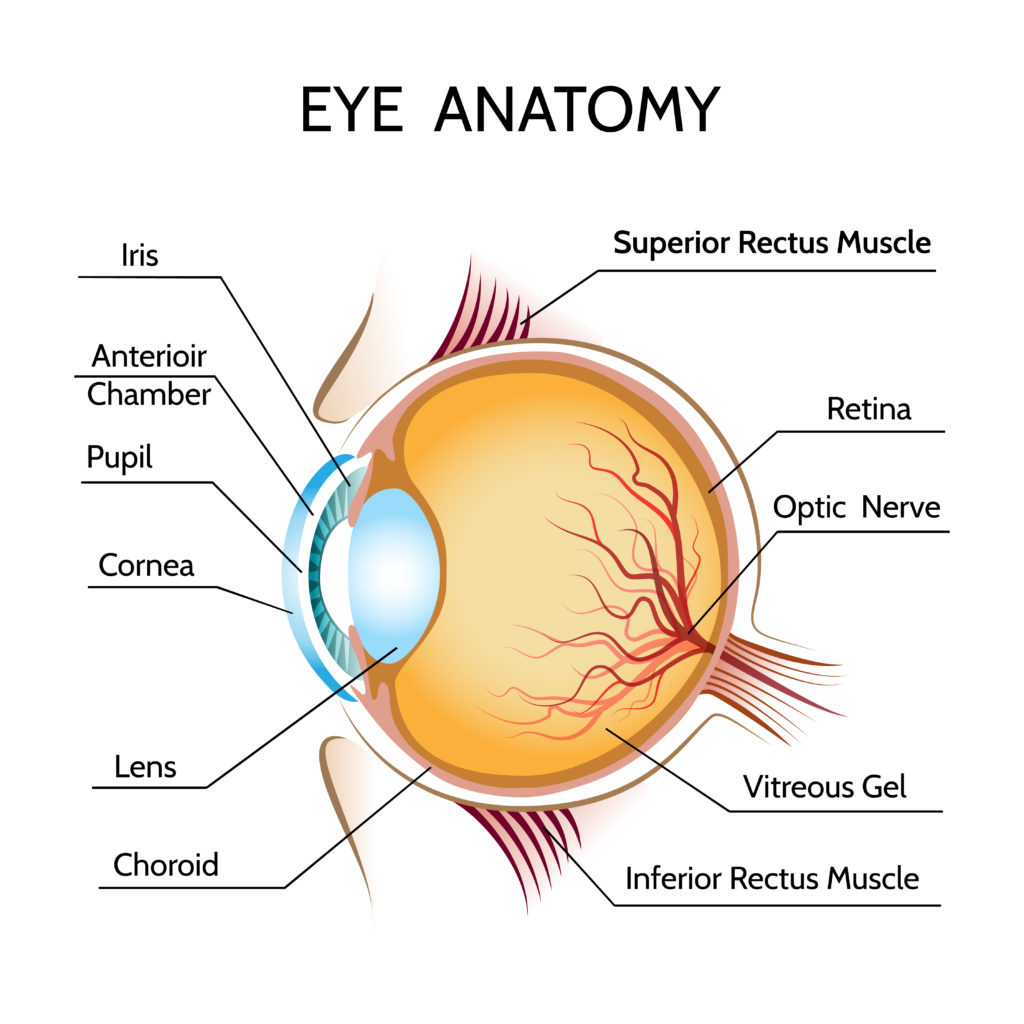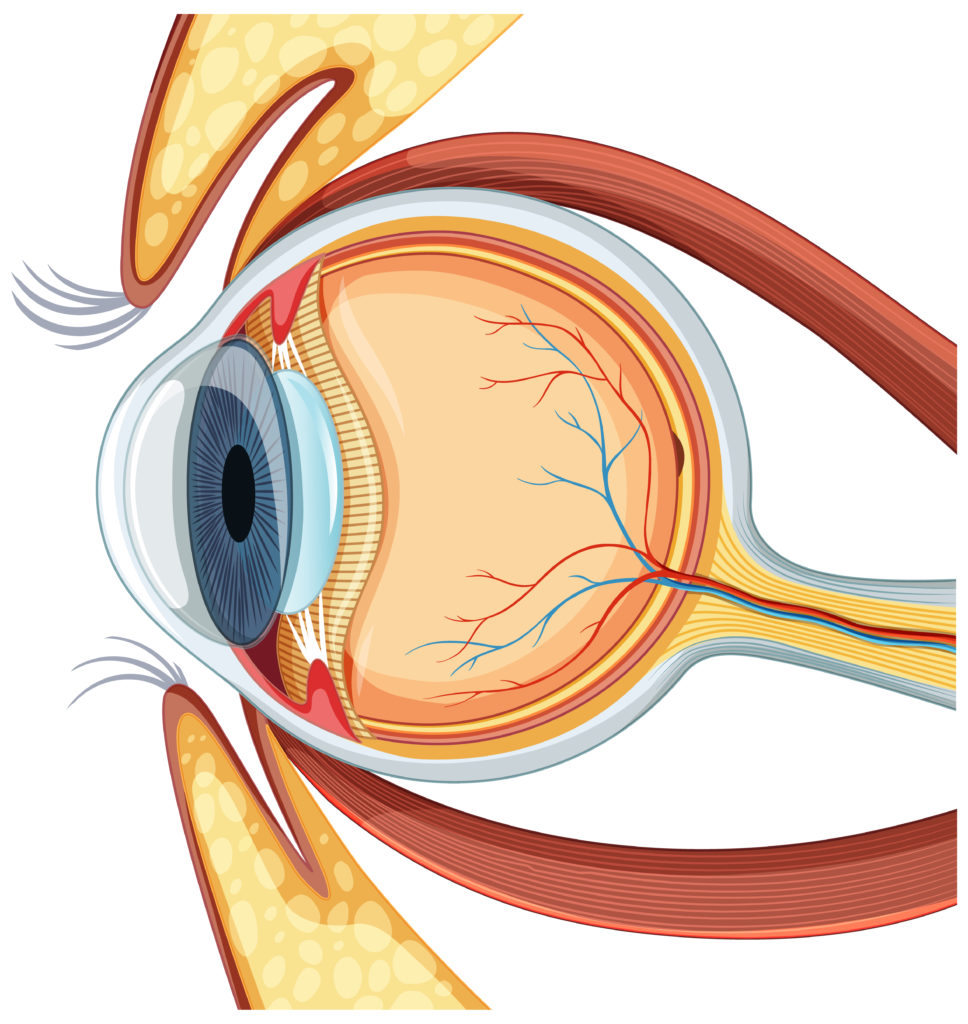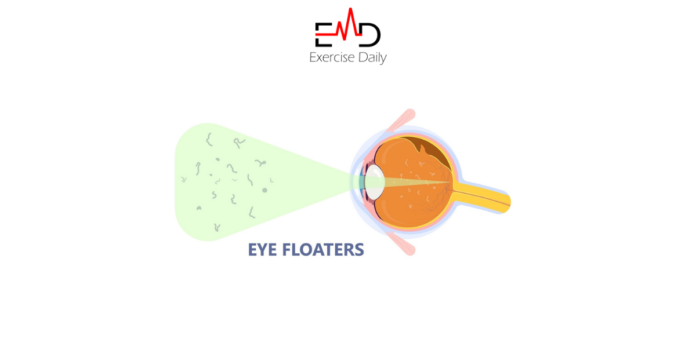Exercise Daily – wondering about are floaters in the eye dangerous? Don’t worry! We have explained everything about eye floaters in this article. Let’s find out.
Eye floaters are little spots that appear in your vision. Depending on your viewpoint, they may seem to you like dark color spots and threads, or cobwebs that move about as you move your eyes and that dart away when you try to look at them directly.
When you become older, the jelly-like material (vitreous) inside your eyes becomes more liquid, which results in the formation of eye floaters.
The vitreous gel contains microscopic fibers that tend to clump together and create little shadows on your retina. Floaters are the shadows that you are seeing.
Consult an eye expert promptly if you observe an increase in the number of floaters in your eyes, especially if you are also experiencing light flashes or losing your peripheral vision. These might be signs of an emergency that need immediate medical treatment.
Symptoms of Eye Floaters
Symptoms of eye floaters include the following:
- Tiny objects that seem like black specks or knobby, translucent threads of floating material emerge in your view as small shapes.
- Spots that move in response to your eye movements, such that when you try to gaze at them, they soon disappear from your visual field.
- Spots that stand out the most against a bright, simple background like the sky or a white wall
- Slight shapes or threads that ultimately settle down and fade away from the area of view
If you are thinking about are floaters in the eye dangerous, let’s take a look at when should you visit a doctor.
When Should You Visit the Doctor?

If you observe any of the following symptoms, contact an eye expert right away:
- There are much more eye floaters than usual.
- The appearance of fresh floaters all of a sudden
- Flashes of light in the same eye as the floaters are another symptom.
- Darkness on one or more sides of your range of vision (peripheral vision loss)
These non-painful symptoms might be caused by a retinal tear, which may or may not is associated with a retinal detachment – a sight-threatening disease that needs immediate medical care and treatment.
Causes of Eye Floaters
When it comes to eye floaters, they can be produced by the natural aging process or by other diseases or disorders, such as those listed below:
Age-related Changes in the Eyes
Your eyes’ vitreous, which is a jelly-like material that fills them and helps them keep their round form as you get older, begins to alter.
After a period of time, the vitreous begins to partially liquefy, causing it to peel away from the inner surface of the eyeball. Clumps and stringiness develop when the vitreous swells and becomes thinner.
Floaters are caused by debris in the eye obstructing part of the light that passes through it, producing small shadows on your retina that are visible.
Inflammation of the Retina
Posterior uveitis is an inflammation of the uveal layers at the rear of the eye that affects both of the eyes. However, your concern about are floaters in the eye dangerous is serious if you have inflammation of the retina.
It is possible that this disease could result in the discharge of inflammatory debris into the vitreous, which will manifest as floaters.
Uveitis in the posterior segment can be caused by infection, inflammatory disorders, or a variety of other factors.
Bleeding in Eye
Many factors can contribute to bleeding into the vitreous, including diabetes, hypertension, blocked blood vessels, and injury. It appears that blood cells are floaters.
Retina Damage
In certain cases, sagging vitreous pulls on the retina with enough force to tear it, resulting in a retinal tear.
A retinal tear, if left untreated, may progress to retinal detachment, which is a buildup of fluid behind the retina that causes it to separate from the back of the eye. A retinal detachment that you do not address might result in irreversible visual loss.
Eye Surgeries and Medicines
It is possible that air bubbles will develop in the vitreous when certain medicines are put into it. Until your eye absorbs the bubbles, they appear as shadows.
Certain vitreoretinal operations introduce silicone oil bubbles into the vitreous, which can be observed as floaters in the eye after the procedure.
Factors that Increase Risk of Eye Floaters

Your concern of “are floaters in the eye dangerous” is valid, but you should know that floaters can be caused by a variety of factors, some of which are as follows:
- Over the age of 50
- Nearsightedness
- Trauma to the eyes
- Complications that might arise after cataract surgery
- Diabetic retinopathy
- Inflammation of the eyes
What is the Best Way to Cure Eye Floaters?
The most commonly prescribed therapy for eye floaters is to do nothing about them. While eye floaters can be unpleasant and bothersome, they are generally not harmful.
The majority of the time, they will wander out of your line of sight and you will cease to see them.
This can be aggravating for those who observe the eye floaters dancing across their vision on a regular basis, but it is the safest option in the vast majority of situations.
Eye Floater Surgery
A surgical procedure for eliminating floaters is available, but it carries a high risk of causing irreversible visual damage.
In situations when there are a large number of floaters and they are beginning to impair your vision, a technique known as a vitrectomy can be done to remove them from your eye.
To remove the gel-like vitreous from inside your eye, a surgical procedure is necessary that entails making incisions in your cornea. Eye surgery can be a risky treatment for “are floaters in the eye dangerous.”
After that, the vitreous is replaced with a solution that is similar to the vitreous. There are a number of hazards that can link with this operation, including the following:
- The development of retinal detachment.
- Tears in the retina are beginning to form.
- Not being able to completely remove the floaters from your eye.
- Cataracts are developing.
This procedure carries a risk of causing permanent vision loss. As a result, many healthcare practitioners will carefully consider all of the advantages and disadvantages of this optional surgery before deciding on this course of action.
Eye Floaters Relief Eye Drops, 0.33 fl. Oz
Homeopathic Eye Floaters Relief is a topical eye drop that is designed to give brief relief for symptoms such as patterns and spidery lines in sight, floaters, dark dots, and dust particles in the vision.
Over time, this product is suitable to gently lessen the symptoms of eye floaters. For optimum effects, be sure you use it on a regular basis. It might take many weeks before you see any improvements.
In addition, there are no documented adverse effects, interactions with other drugs, or contraindications to using Eye Floaters Relief.
Relief Products is a family-owned and run business that has been in operation for 32 years and specializes in over-the-counter homeopathic medicine.
Relief Products have a single mission: to assist as many people as possible in maintaining their health via natural means. This purpose has served as the cornerstone for the company’s continuous growth and development.
Similasan Aging Eye Relief 0.33 Fluid Ounce
Thinking about are floaters in the eye dangerous? Experiencing cloudy or hazy vision? The onset of issues such as corneal opacity and macular degeneration, which can result in foggy or fuzzy vision, is not uncommon as we grow in age.
Each of us wishes to have the best possible health of our eyes. Similasan Aging Eye Relief eye drops are particularly formulated to promote corneal and macular health and give brief relief for dryness which can arise as eyes age.
Similasan eye drops are created with natural botanical extracts such as Cineraria maritima, which helps to promote the body’s natural capacity to maintain a clear crystalline lens, and Herb-of-grace, which helps to temporarily alleviate dryness.
This means you may obtain relief without the use of harsh chemicals in the formulation. It is possible to use contact lenses with this product.
Drops will not harm lenses although performance could be greater when applied without lenses. If you have redness, itching, or irritation, it is suitable to avoid lenses for a time.
Natural Organic Eye Care Supplement for Eye Floaters
With the advent of the digital era, we have placed huge stress on our eyes, from cell phones to television, and the list goes on.
We must take extra precautions to protect our eyes before it is too late. EyeCare supplies them with natural nutrients that are essential for maintaining the health of our eyes. With these supplements, you wouldn’t care about are floaters in the eye dangerous.
EyeCare is largely concerned with inflammation and the pressure buildup that occurs around and inside the eyes as a result. It also contains natural substances that are well-known and frequently utilized for maintaining healthy eyes.
In a fully functional, efficient team, this pure organic, unique synergistic mix improves the body’s capacity to get the full advantages of Maqui berry, Goji berry, Carrot, and other vital nutrients, among other things.
It is a wonderful source of natural nutrients that are well-known for their benefits to eye health and clear eyesight.
Organic eye care supplement is effective in reducing Eye Floaters, providing comfort for Dry Eyes, and serving as a natural alternative to eye vitamins. It is a beneficial complement to the eyesight formula. Nature has provided us with a wonderful gift.
What Causes People to Notice Eye Floaters?

The cornea and lens, which are located at the front of the eye, are responsible for focusing light rays onto the retina, which is the light-sensitive tissue that lines the inside of the eye.
The ability to see is provided by light reflected from pictures in our environment that are focused onto the retina.
Visible light that is directed toward the retina travels through the vitreous humor, which is a jellylike substance that fills the posterior two-thirds of the eye.
In most cases, the vitreous gel is completely clear and transparent at birth and into the early childhood years. It will cause you to think are floaters in the eye dangerous.
Later in age, strands, deposits, or liquid pockets can form inside the vitreous gel, which can be quite uncomfortable.
When there is a shift in density, each change throws a little shadow onto the surface of the retina, and these shadows are interpreted as eye floaters by the patient who is experiencing them.
They are often a pale black to translucent hue in appearance. As the eye moves from side to side or up and down, the position of these strands, deposits, or pockets within the eye shifts as well, giving the illusion that the shadows are moving and appear to float or undulate.
What is the Risk of Developing Eye Floaters?
Eye floaters are highly prevalent in adults, and they are one of the most common symptoms that cause patients to seek treatment from an ophthalmologist.
When people reach the age of 70, almost everyone develops eye floaters, but some people are considerably more conscious of them than others. It is uncommon for children under the age of 16 to detect eye floaters and they may not link with an underlying eye condition.
Are Floaters in the Eye Dangerous?

Although eye floaters can be irritating and anxiety-inducing, they are not hazardous in and of themselves and you should not ignore them.
Typical aging changes cause eye floaters inside the eyeballs themselves.
However, a person who experiences the rapid emergence of eye floaters should be examined by an ophthalmologist to ensure that there is no related ocular abnormalities or systemic disease that need medical attention.
If you see a fast start of multiple eye floaters or if you have eye floaters coupled with flashing lights, this might indicate a retinal tear that has to be treated immediately to avoid retinal detachment.
A curtain or cloud in the vision, as well as a loss of side vision, might be signs of an accompanying retinal detachment and you should take it seriously.
Do Floaters in the Eyes Go Away?
The majority of eye floaters shrink in size, density, and blackness as time passes. It is possible that some of this is due to real absorption of the floater by the eye’s normal processes, although this is unlikely.
It is also possible for eye floaters to change in position within the eye, which would result in a reduction in the shadow effect. After reading this you might get your answer of “are floaters in the eye dangerous”.
The human brain also has a tendency to become adapted to the existence of eye floaters and is capable of completely disregarding them in a manner similar to the way a person only perceives the sensation of shoes on their feet when they are thinking about it.
After some time, eye floaters tend to become less irritating, due to a combination of factors including reduction in density and size, as well as the previously stated process of neuro-adaptation.
In other cases, floaters become more visible as a result of people’s anxiety over the condition.
Are Floaters in the Eyes An Inherited Condition?
Eye floaters are a common occurrence in older people. Other visual problems, such as retinal tears or detachment, might, on the other hand, result from inheritance.
If you have a family history of retinal detachment or tears, you may be at a higher risk of having one in the future than the general population. Floaters and flashes in the eyes are possible symptoms of retinal detachment or retinal tears in the eye.
Other risk factors that you can inherit through your family may relate to your vision — especially nearsightedness — and can pass down through generations.
It’s possible that being nearsighted increases your chances of acquiring floaters in your vision. It is possible that this will eventually result in retinal detachment.
Many persons who suffer eye floaters do not have a family history of retinal detachment or retinal tears, although this is not always the case.
Always keep in mind that eye floaters are a normal component of the aging process and that they can occur at any point during your lifetime.
What Kind of Questions Will My Doctor Ask Me Regarding Eye Floaters?
Your Concern about are floaters in the eye dangerous is valid, but when you see your eye care provider for an appointment to diagnose eye floaters, he or she will want to know as much as possible about your vision and what you have been seeing.
This is a necessary step in the diagnostic process and will assist your physician in determining what is causing your vision problems.
The greater the amount of information you can offer, the better. Some of the questions your provider may ask you include the following:
- When did you first detect the floaters in your eyes?
- Do you know what your eye floaters look like, and how many of them do you notice at a given time?
- How frequently do you get floaters in your eyes?
- Have you ever seen bursts of light appear in your vision?
- Have you ever had any type of eye surgery in your life?
- Is it possible that you’ve suffered an eye injury?
- Is there anything in your field of vision that is obscured (imagine a curtain in front of your eyes)?
- Are there any shadows on the side of your vision (peripheral vision) that you can see?
- Do you suffer from any autoimmune disorders?
- Do you have diabetes?
When you first notice a vision problem, it might be beneficial to keep a diary of your experiences.
Make a list of everything you observed, including specifics such as the length of time it lasted. When you go into your provider’s office for your visit, you may find this to be a useful resource.
Are Floaters in the Eye Dangerous – FAQs
How long do floaters in the eye last?
The amount of time it takes for them to vanish might also differ. The majority of the time, floaters will shrink in size every day until they disappear completely.
It might take anywhere from one to six months for some floaters to completely vanish, depending on their size at the start. Some, on the other hand, may never entirely go.
Are eye floaters normal?
Floaters in the eyes are quite prevalent. They are so common that nearly everyone will encounter them at some point throughout their life.
A common occurrence associated with the aging process are floating eyes, which occur as a result of a change in the clear material inside the eye (vitreous gel).
What vitamins help floaters?
Vitamin C is beneficial in the elimination of waste and the neutralization of oxidation. Citric acid enhances lymphatic and blood circulation.
If you experience floaters, you should not take more than 1,500 mg per day. A high intake of vitamin C can impair the absorption of other nutrients and can cause floaters to grow.
When should you worry about floaters?
Eye floaters are frequent, and they can be a nuisance, but they’re typically not something to worry about. If you experience a lot of floaters that occur abruptly, or other eye issues along with eye floaters, get medical attention immediately afterward.
Can dehydration cause floaters?
Another factor that contributes to eye floaters is dehydration. The vitreous humor in your eyes contains 97% of water.
If you have dehydration all of the time, this gel-like material might lose its form or even shrink. A consequence of this is that the proteins in this material do not remain dissolved. Moreover, it solidifies, which might result in the appearance of floaters.





